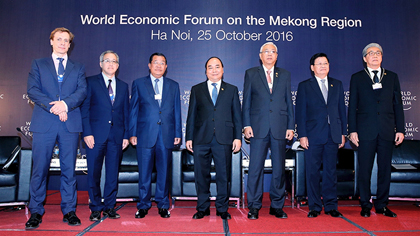PM stresses economic, infrastructure connectivity in Mekong region
Countries in the Mekong region should enhance their economic and infrastructure connectivity and in particular develop complete sub-regional economic corridors, said Prime Minister Nguyen Xuan Phuc.
Addressing the World Economic Forum on the Mekong Region (WEF-Mekong) in Hanoi on October 25, the PM urged the regional countries to foster their cooperation in a bid to facilitate trade, investment and tourism.
 |
| Prime Minister Nguyen Xuan Phuc and leaders attending the World Economic Forum on the Mekong |
At the same time, priorities should be given to boosting innovations and creations to improve productivity and optimise opportunities afforded by the fourth industrial revolution, he said.
The leader appealed to the nations to hasten the implementation of sustainable development goals (SDGs), including the sustainable management and use of the Mekong River’s water resources.
The move aims to build a Mekong region of peace and stability in security and politics, dynamism and connectivity in economy, sustainability in the environment and harmony in social affairs, he noted.
He stressed that Vietnam is making every effort in restructuring the national economy and reforming its growth model while proactively and actively integrating into the international community, citing the country’s constructive engagement in negotiations, as well as the signing and implementation of many free trade agreements.
The Vietnamese Government will continue to improve investment and the business climate for enterprises in and outside the region, and step up public-private partnerships for the sustainable development of the country and the region at large, he promised.
The WEF-Mekong, themed “Greater Mekong Subregion Development: Investment in infrastructure, human resources and connectivity”, was also attended by Cambodian PM Samdech Techo Hunsen, Lao PM Thongloun Sisoulith, Myanmar President Htin Kyaw and Thai Deputy PM Somkid Jatusripitak, along with economic ministers of the Mekong countries, representatives of businesses and groups, experts and scholarships.
Other delegates pointed out that the Mekong region has the potential to become a new production centre of Southeast Asia and the world as well.
The Mekong countries boast various reciprocal advantages that can facilitate economic integration and connectivity, the development of regional value chains and their connectivity with nations in Southeast Asia and the world, they said.
They made proposals to enhance the economy and infrastructure in the Mekong region, especially transport infrastructure along sub-regional economic corridors, facilitate trade, investment and tourism, develop high-quality human resources and boost cooperation in luring investments in and outside the region.
Some said the Mekong region is facing challenges generated by industrialisation and development such as unsustainable use of natural resources, environmental degradation and the widening gap between the rich and the poor.
The same day, PM Phuc and his spouse hosted a gala dinner for participants of the three Mekong conferences.
(Source: NDO)
.
 về đầu trang
về đầu trang






